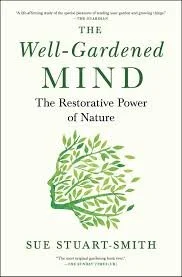May for Mental Health: Tending Gardens, Tending Ourselves
by Danielle, Design Director
Envision Landscape Studio
How Our Landscapes Support Mental Health
When designing outdoor spaces, I often reflect on how essential the land is to our overall well-being — mind, body, and spirit. There’s a reason we feel mentally lighter after a walk in the fresh air, or why planting a tree can feel so deeply satisfying. When we connect with the land, we're also connecting with ourselves.
Modern research continues to affirm what gardeners have known for generations: tending a garden supports mental health. Studies show that gardening — or even simply standing barefoot on the earth — can reduce anxiety and depression, improve mood, and build resilience to stress. None of this is new news, but it’s worth remembering.
Here’s one fascinating fact: soil contains beneficial microbes — notably Mycobacterium vaccae — that naturally boosts serotonin levels, often called the "happiness chemical." And no, this doesn’t mean you need to eat dirt! Just touching the soil is enough to reap the benefits.
From my experience designing landscapes, I’ve seen firsthand how creating and engaging with living spaces can ground people in ways that words can barely describe. It's not just about visual appeal — it's about building places for belonging, processing, reflection, and, like the seasons, renewal.
If you're looking for simple ways to connect more deeply to your outdoor spaces, here are a few practices to start:
Plant with Purpose Design. A destination with intention for your garden. These could be small corners of calm: a bench surrounded by lavender, a tucked-away reading nook beneath a paperbark tree (also known as tea tree oil) or a winding gravel path lined with sage. All these plant selections awaken your senses, along with so many more. Plant with purpose, always.
Did you say awaken senses? Plant gardens that engage sight, touch, scent, and even sound — think of rustling grasses or a small water feature. Wind chimes for moments of zen or even birdhouses to welcome the habitat. This list could go on and on. Sensory gardens have been proven to lower cortisol, the body’s primary stress hormone, helping you unwind naturally by simply being in the garden.
Create Rhythms of Care. Let's say this one all together - there is no such thing as a no-maintenance garden. And frankly, there shouldn't be. Simple, repetitive tasks like weeding, watering, and pruning offer gentle physical activity and a comforting routine. These acts of stewardship reinforce our connection to the earth — and to ourselves.
If you’d like to dive deeper into the powerful relationship between gardens and mental wellness, I highly recommend these beautiful books:
A stunning exploration of how gardening can be a powerful tool for healing, based on both psychology and experiences from people who found new life among plants. This book felt like a direct hit to my soul.
Blending Indigenous knowledge and scientific understanding, this book reminds us that tending to the Earth and ourselves is an act of gratitude and mutual care. I could re-read this one every season.
While not directly about nature, its message of self-awareness and healing resonates deeply during quiet moments outdoors.
As a designer, my hope is always to create spaces that don't just look good, but feel good — spaces where you can breathe deeper, move slower, and reconnect with yourself and the living world around you.In tending our gardens, we tend to our own inner landscapes too.Take it easy, May.
x,
Danielle





